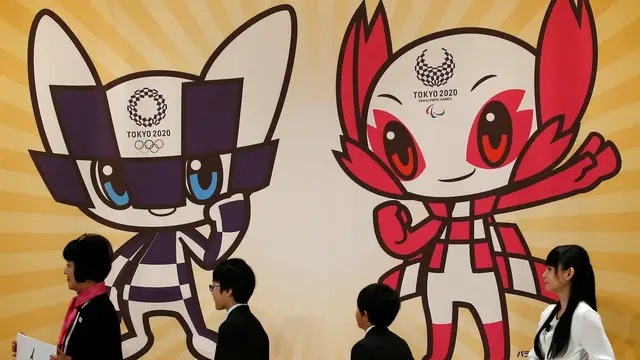Have you ever imagined winning a gold, silver or bronze Olympic medal refined from waste cellphones, laptops or other electronic appliances?
Next summer in Tokyo, athletes from around the world will have the chance to win Olympic medals made entirely from recycled metals, a first for the Olympics and Paralympics. And the medal design will be revealed this summer.
In the Tokyo 2020 Medal Project, 30.3 kilograms of gold, 4,100 kilograms of silver and 2,700 kilograms of bronze are required to manufacture approximately 5,000 medals. But what is behind the high efficacy of collecting such amounts of refined metals from tons of waste electronics across Japan?
We got answers from the Tokyo 2020 Organizing Committee in a recent journalist exchange program organized by the Trilateral Journalist Exchange Program (TJEP) under the Trilateral Cooperation Secretariat (TCS).
"We have completed the collection of small electronic devices for the Tokyo 2020 Medal Project at the end of Sunday 31 March 2019," said Kentaro Kato, project director of media relations of the Tokyo Organizing Committee of the Olympic and Paralympic Games.
By March 2019, the Medal Project had achieved overwhelming participation across Japan: 1,621 municipal authorities, approximately 90 percent of the municipal authorities in Japan, were taking part in the project.
To get these precious metals, approximately 78,985 tons of used small electronic devices, including mobile phones, were collected across Japan by municipalities. And nearly 6.21 million used mobiles phones were collected by partner-company NTT DOCOMO shops across Japan by the end of March 2019.
To realize a sustainable society and secure the Olympics and Paralympics legacy, the Tokyo 2020 Organizing Committee is actively working with project participants, NTT DOCOMO, the Japan Environmental Sanitation Center, the Ministry of the Environment and the Tokyo Metropolitan Government.
Today, tons of electronic waste in Japan have become a rich "urban mine" or toshikouzan in Japanese. Professor Nakajima, a researcher at the Waseda University Environmental Research Center in Tokyo, said that a mobile phone contains more than 20 precious metals such as gold, silver, copper and aluminum.
The high efficiency of home appliance recycling assures that Japan will acquire more precious metals. And Japan's systemic recycling and refinery mechanism has operated for years.
Since April 2001, Japan has implemented the "Household Appliance Recycling Law," which divides household appliances into four categories: air conditioners, TV sets, refrigerators, and washing machines. Home-Appliance recycling companies are responsible for recycling old home appliances from users and handing them over to manufacturers.
In April 2013, Japan implemented the "Small Appliances Recycling Law," which aims to recycle small electronic products such as mobile phones, computers, hard disks, printers, video cards, and digital cameras. To achieve eco-friendly resource recycling, the Japanese government has set up recycling bins in 70,000 locations across the country to recycle small electronic products to refine metal materials for medals.
So the Tokyo 2020 Medal Project, "Towards an Innovative Future for All" is not only a vision but also a mature industry which requires advanced refining capabilities and technologies of companies, such as Tanaka Kikinzoku Kogyo and Minami Kinzoku Co., Ltd. They have been approved by the Japanese government to dismantle electronic devices to recycle precious metals.
During a site visit in Tokyo, it was demonstrated that Japanese technology could extract more than 30 precious metals from old appliances today. Although the cost of refining is higher than the exploitation of natural resources, it saves a great amount in transportation and transit costs. In the end, the overall cost is not much higher than imported natural resources. Compared with some resource-rich countries, Japan's "Urban Electronic Mine" ranks top in the world in terms of gold, silver and lead, and its copper content.
In recent years, many countries, including Japan, have faced mounting problems of rising waste electronic products. Improper disposal of electronic waste is not only causing heavy pollution and poison to the environment but also wasting precious natural resources such as minerals, chemical products, and many others.
The Japanese example of recycling waste electronics provides valuable experience for other countries to learn from and nurture new industries. As Shanghai becomes the first Chinese city to implement garbage classification, it will help China to mature its resources-recycling sector and to contribute to a greener and more sustainable development.
(CGTN)
 简体中文
简体中文

